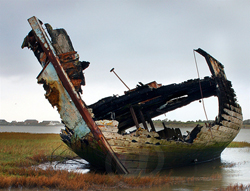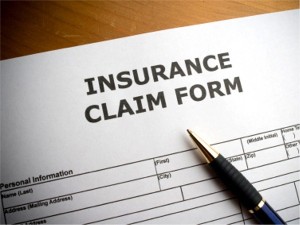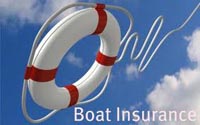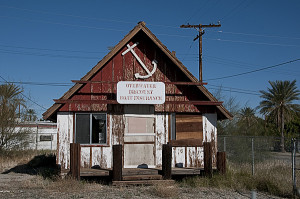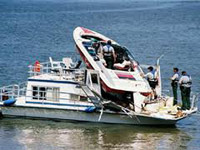This is a follow up to our newsletter article entitled “When to file a boat insurance claim”. In the previous article we discussed various types of coverage on boat insurance policies to raise awareness of benefits provided by a boat insurance policy. The article was a real thrill ride; you can read it on our web site – themarinesurveyors.com
Once an insurance claim is filed you have certain responsibilities and rights. Filing a boat insurance claim is rare and many of the insureds and claimants, with whom we deal, have had no prior experience with a boat claim and very limited experience with any insurance claim. Once you fulfill your obligations you deserve a relatively smooth and timely process to the completion of the claim.
To file a claim simply contact your agent or insurance company. Your agent may be an independent agent or an employee of the insurance company. Either way contacting them will begin the process and they will request information, your job is to provide the information in a timely manner.
In California and many states, the handling of a marine insurance claim is governed by the Fair Claims Settlement Practices Regulations or Fair Claims Act, designed to protect consumers. As long as the policy is written by an admitted California insurance carrier (versus a non admitted or surplus lines carrier), the policy holder is covered by this law. The law assures the policy holder a fair assessment, fair settlement offer and a well defined time line. Basically the Fair Claims Act requires the insurance company to investigate and decide coverage within thirty days of the date the claim was filed. If the claim is covered it requires the insurance company to pay the claim in full, based on the contract of insurance, preventing insurance companies from making low ball offers for settlement. It requires the insurance carrier to either deny the claim or provide the insured with a reservation of rights (ROR) letter. The ROR letter must detail the reasons for a possible denial, and must be sent as soon as the adjuster becomes aware that the claim may be denied, if the investigation is not completed to the point where they can issue a denial letter. The denial letter must be in writing and reference the specific policy language which is the basis for the denial.
The Fair Claims Act also provides an easy option for an insured who feels they have been treated unfairly. The insured can file a complaint with the state’s department of insurance and the claim will be reviewed at no cost to the insured. A complaint is a thorn in the adjuster’s side, and most adjusters prefer to avoid the process.
So, what are your obligations after filing a claim? In general it is the insured’s responsibility to “prove their claim”. To begin the claim process, contact your insurance agent or the claims contact number on the policy and provide the information requested. From the beginning, document your activities including date of initial and subsequent phone calls and name of contact. Obtain a claim number, telephone number and e-mail address for your adjuster. We recommend an immediate follow up to the initial call via an e-mail to the adjuster and/or agent. The fair claims clock begins ticking with the first contact with the agent or claims department.
With no extenuating circumstances the insurance company has thirty days from the date you filed the claim to determine coverage.
Expect to be asked a series of questions regarding the history of the vessel, maintenance relevant to the loss, event details and a description of the damage.
It is your obligation to provide honest and factual answers. It is not your obligation to be a boat repair professional, mechanic, electrician or forensic engineer. You do not need to know exactly why your engine failed, what object you ran over or how the fire started. You simply need to provide answers to questions to the best of your ability. You may be asked to write a “master’s statement”; if so, just provide the basic facts, in writing, expediently.
Immediately after any accident, act as a prudent uninsured. In other words, take immediate actions which you would take if you did not have insurance, mitigate (minimize) the damage as possible. Most insurance policies require the boat owner to mitigate the damage and the cost of mitigating actions are usually compensable, sometimes even if the claim itself is denied. Either way it is your boat and prudent actions will save your time and money. The classic example of mitigating damage is when an engine suffers water damage internally or externally. There are clear and well known mechanical procedures to mitigate this damage and they should be initiated immediately as time is of the essence in this type of loss.
The determining factor in coverage is the cause of loss. As discussed in the prior newsletter article the various sections of your policy provide coverage for a multitude of events while also excluding a multitude of events. It is the cause of the damage which is the crucial factor in determination of coverage. Sudden, accidental and fortuitous events are generally covered. Wear, tear and gradual deterioration are generally not covered.
You, as the insured, should expect an explanation of the process including the steps the adjuster requires to determine the cause of loss. This may include an inspection by an independent marine surveyor or specialist in the type of damage to your boat. It may require discovery, or some type of destructive inspection process or disassembly. This cost is often covered by the insurance company; we suggest prior written communication to establish who is responsible for any charges in the “discovery” process. This prevents surprises.
In order to facilitate the payment of a covered loss, you will need to choose a repair facility and obtain an estimate for the repair. We recommend choosing an established, reliable repairer. Their timely preparation of an estimate is crucial in the claim process and their timely and professional completion of the repairs is critical to the continuation of your boating enjoyment. Choose a repairer known for staying within budget; overruns lead to headaches and can usually be avoided.
Once you have received an estimate, forward it quickly to your claims adjuster. They can’t pay a claim unless they know how much to pay. Review the estimate for completeness and make sure all damage is addressed. At this point we suggest an e-mail to the adjuster to confirm they have received all documents required to handle the claim. They may have still need maintenance records, sales receipts, a master’s statement or statements from witnesses. Make sure you have complied with all their requests. This will prevent further delays, which may be caused by loose ends.
At this point it is the insurance adjuster’s responsibility to process your claim expeditiously. Though it is sometimes omitted, we prefer the adjusters provide an explanation of the claims payment. A synopsis of the basis of the payment including approved estimate repair amounts and applicable deductible and depreciation is crucial in to the proper explanation of the claim settlement. On first party (your insurance) property damage claims you will have a deductible and there may be depreciation applied (read your policy). Depreciation is a reduction in the payout based on the age and/or condition of the damaged components. An older engine or sail which need replacement may not be paid for completely. Some policies and some components are not depreciated and thus are paid for on a “new for old” basis. If you are pursuing a liability claim (another party’s insurance), you will not have a deductible, but depreciation will almost always apply.
Once you have received payment it is your choice as to how to have the repairs completed. Depending on the severity of the damage and the extent of repair necessary, you may have numerous options. In case of severe damage, which limits the continued insurability of the vessel, you may be required to complete all of the necessary repairs. This may be required by either the insurance company or by a lender. Any lien holder named on the insurance policy will often be named on the settlement check.
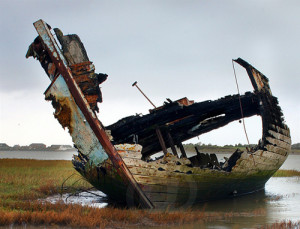
Claims involving large amounts of money are heavily scrutinized by claims departments. They will look carefully at all aspects of the claim and they will review your insurance application. It is imperative that your application is filled out completely, honestly and accurately. Any false information or omission on an application can lead to a policy rescission (cancellation). If the policy is rescinded, you get back your insurance premium, but no claim payment. Don’t embellish your experience or omit a prior claim on the application.
If you have an idea that an event may be a covered insurance claim, contact your agent immediately. The agent may advise you to hold off on the filing of the claim (with the carrier) until some further determination is made, but you will prevent future coverage issues by quickly contacting the agent. Do not initiate repairs and alter or discard the crucial components prior to allowing the insurance company an opportunity to inspect the damage, as this will create problems. It is only fair that the insurance company be allowed the opportunity to inspect critical components. They may have coverage issues or subrogation (an ability to recover their loss) potential that can’t be addressed or pursued without an inspection. Thus the contract of insurance provides them rights as well. It is unfortunate when an otherwise covered loss is claimed after repairs are completed but the claim is denied because the insurance company’s rights have been compromised.
There are insurance companies that write directly, usually communicating via telephone from a central national location. There are insurance companies that write through agents, who are often located in your home city. While there are examples of both good and not so good insurance companies writing directly or through agents, a local, knowledgeable and helpful agent is invaluable during the claim’s process. This type of policy may be more expensive, but during the claim’s process the premium is well earned.
All claims are not covered and that is the nature of the business. However, since a few ship owners developed this concept of insurance at a coffee shop in London, marine insurance claim payments have helped a myriad of boat owners manage their risks associated with vessel ownership and reduce the stress arising from boat accidents.
Christian & Company Marine Surveyors got their start in marine damage claims and continues to be active in this process. We represent insurance carriers, boat owners, repair facilities and various interested parties in the process.
Please keep Christian & Company in mind if we can be of assistance and help in the process of recovery from any accident or damage to your vessel.
This article was edited on February 29, 2016.
